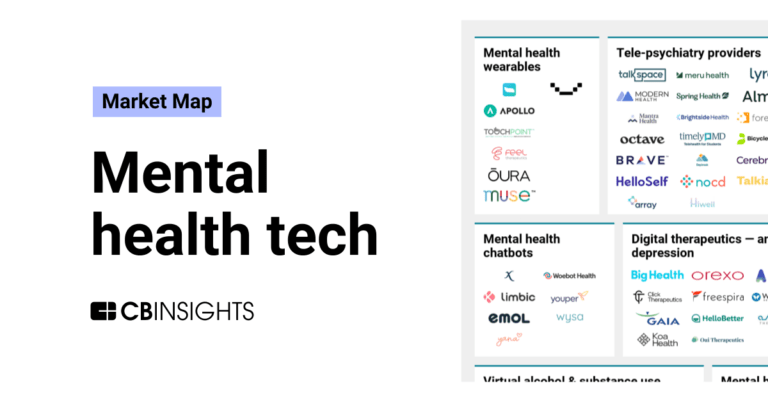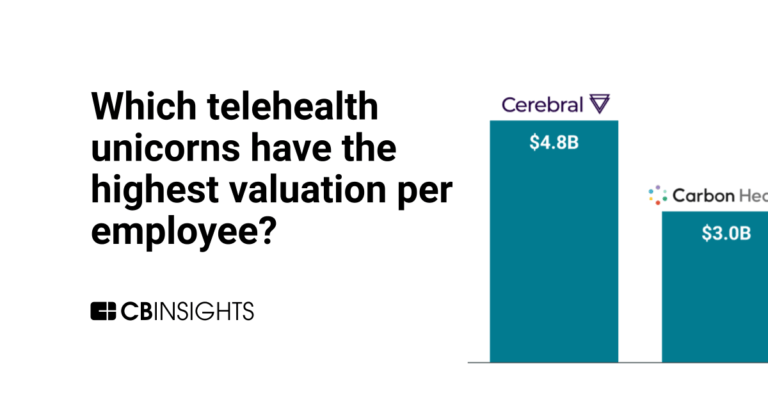
Cerebral
Founded Year
2019Stage
Series C | AliveTotal Raised
$462MValuation
$0000Last Raised
$300M | 3 yrs agoMosaic Score The Mosaic Score is an algorithm that measures the overall financial health and market potential of private companies.
+29 points in the past 30 days
About Cerebral
Cerebral is a company that provides online mental health care services across various domains. Its offerings include virtual therapy sessions, consultations with licensed prescribers, and treatment plans for mental health conditions. Cerebral serves individuals seeking mental health care. It was founded in 2019 and is based in Walnut, California.
Loading...
ESPs containing Cerebral
The ESP matrix leverages data and analyst insight to identify and rank leading companies in a given technology landscape.
The D2C prescription behavioral health services market offers mental health and behavioral health services directly to consumers, typically without the need for traditional in-person healthcare provider involvement. These services leverage digital platforms, telemedicine, and personalized approaches to provide convenient, accessible, and evidence-based solutions for individuals seeking treatment f…
Cerebral named as Challenger among 8 other companies, including Hims, Talkiatry, and Brightside Health.
Loading...
Research containing Cerebral
Get data-driven expert analysis from the CB Insights Intelligence Unit.
CB Insights Intelligence Analysts have mentioned Cerebral in 2 CB Insights research briefs, most recently on Sep 13, 2023.

Sep 13, 2023
The mental health tech market mapExpert Collections containing Cerebral
Expert Collections are analyst-curated lists that highlight the companies you need to know in the most important technology spaces.
Cerebral is included in 4 Expert Collections, including Unicorns- Billion Dollar Startups.
Unicorns- Billion Dollar Startups
1,270 items
Digital Health
11,306 items
The digital health collection includes vendors developing software, platforms, sensor & robotic hardware, health data infrastructure, and tech-enabled services in healthcare. The list excludes pureplay pharma/biopharma, sequencing instruments, gene editing, and assistive tech.
Telehealth
3,114 items
Companies developing, offering, or using electronic and telecommunication technologies to facilitate the delivery of health & wellness services from a distance. *Columns updated as regularly as possible; priority given to companies with the most and/or most recent funding.
Mental Health Tech
791 items
This collection includes companies applying technology to problems of emotional, psychological, and social well-being. Examples include companies working in areas such as substance abuse, eating disorders, stress reduction, depression, PTSD, and anxiety.
Cerebral Patents
Cerebral has filed 2 patents.
The 3 most popular patent topics include:
- g protein coupled receptors
- health informatics
- homelessness

Application Date | Grant Date | Title | Related Topics | Status |
|---|---|---|---|---|
4/2/2020 | Olfactory receptors, Psychiatric diagnosis, G protein coupled receptors, Syndromes, Pain scales | Application |
Application Date | 4/2/2020 |
|---|---|
Grant Date | |
Title | |
Related Topics | Olfactory receptors, Psychiatric diagnosis, G protein coupled receptors, Syndromes, Pain scales |
Status | Application |
Latest Cerebral News
Apr 1, 2025
| Membership (fee-based) Share Save Zameer Rizvi is CEO and Founder of Odesso , improving patient outcomes through artificial intelligence and machine learning. getty Healthcare technology is evolving fast: AI-powered diagnostics, health trackers and robotic-assisted surgeries are just a few of the innovations changing the game. With all this progress comes a major challenge: security. Without a security-first mindset, even the most groundbreaking innovations can be compromised, putting patient data, trust and even lives at risk. The Increase Of Cyber Threats In Healthcare It’s 2025, and medical technology is more advanced than ever. AI-driven tools are helping doctors with more accurate diagnoses, remote monitoring is keeping patients connected to care and new treatments are being developed at an incredible pace. The truth is that cyber threats are evolving just as fast . For health tech companies, security isn’t just crucial; it’s non-negotiable. So, what does it mean to take a security-first approach, and why does it matter so much for advancing MedTech innovation? Let’s break it down. Why Patient Data Is A Goldmine For Cybercriminals Smart technology in healthcare can collect a ton of personal and sensitive information, including medical histories, test results and even real-time health data. AI-driven tools, wearable health devices and remote monitoring systems all rely on this data to function effectively. This innovation has also become a goldmine for cybercriminals. In 2024 alone, 172 million people in the U.S. had their health data exposed in major breaches, according to the Department of Health and Human Services Office of Civil Rights. When patient data gets into the wrong hands, it becomes more than a privacy issue; it can lead to fraud, identity theft and even compromised medical treatments. A security-first approach means companies need to build protection into their systems and the AI technologies they rely on from day one. This includes strong encryption, real-time threat monitoring and strict access controls. Trust Is Key In healthcare, trust is everything. Patients need to know their personal information is kept safe, and hospitals need confidence that the technology they’re using won’t put them at risk. One security breach can wipe out years of credibility and create serious legal and financial problems. That’s why security can’t be an afterthought. It has to be part of the process from the start. Companies that follow strict security practices and regulations (like those required by HIPAA) aren’t just checking a compliance box; they’re proving to patients and healthcare providers that they take data protection seriously. Balancing Security And Innovation AI is shaping the future of healthcare, but it can also create new security risks without the right measures. Take, for example, the Cerebral data breach in 2023. The mental health startup unintentionally exposed the protected health information (PHI) of over 3.1 million patients to advertisers. The company had installed tracking pixels from Google, Meta and TikTok, which led to PHI being leaked. As a result of this violation, names, phone numbers, email addresses, birthdates, IP addresses and even patients’ self-assessments may have been exposed. Breaches like these can be prevented with strong security measures. Most importantly, healthcare and IT teams at MedTech companies must be fully aligned and ensure they work together to close any security gaps. The Future Of MedTech MedTech is driving incredible advancements in healthcare. We see this in recent technology such as the integration of AI, wearable devices and telemedicine. Without security at its core, these innovations could become liabilities instead of breakthroughs. Instead of reacting to security breaches when they happen, companies must take a proactive approach by building security into every layer of their technology from the start. The organizations that make security a priority will be the ones shaping the future of healthcare. For those that don’t, they risk losing everything, including trust, credibility and their place in the industry. One thing is certain: Security isn’t just a box to check—it’s a fundamental framework that should guide every decision an organization makes. It’s the foundation for lasting, meaningful innovation in MedTech. Follow me on LinkedIn . Check out my website .
Cerebral Frequently Asked Questions (FAQ)
When was Cerebral founded?
Cerebral was founded in 2019.
Where is Cerebral's headquarters?
Cerebral's headquarters is located at 340 S Lemon Ave, Walnut.
What is Cerebral's latest funding round?
Cerebral's latest funding round is Series C.
How much did Cerebral raise?
Cerebral raised a total of $462M.
Who are the investors of Cerebral?
Investors of Cerebral include WestCap, Artis Ventures, Access Industries, SoftBank, Prysm Capital and 9 more.
Who are Cerebral's competitors?
Competitors of Cerebral include Anise Health, Spring Health, Brightside Health, Twill, Octave and 7 more.
Loading...
Compare Cerebral to Competitors

Lyra Health operates in workforce mental health care within the health benefits industry. The company provides a digital platform that connects employees to mental health providers and tools, utilizing artificial intelligence (AI) for provider matching and offering evidence-based support. Lyra Health serves employers seeking to provide mental health benefits and support employee well-being. It was founded in 2015 and is based in Burlingame, California.

Brightside Health focuses on providing mental health care services. It offers online treatment for a range of mental health conditions, including anxiety, depression, insomnia, post-traumatic stress disorder (PTSD), and more, utilizing a combination of licensed psychiatric providers and therapy techniques. Brightside Health was formerly known as Good Measure. The company was founded in 2017 and is based in San Francisco, California.

Modern Health serves as a global mental health solution provider in the healthcare industry. It offers services including one-on-one clinical therapy, group therapy sessions, and self-guided mental health resources designed to support the emotional, professional, social, financial, and physical well-being of employees. It primarily serves employers, consultants, health plans, and individuals seeking mental health benefits for their workforce or clients. Modern Health was formerly known as Modern Healthcare. It was founded in 2017 and is based in San Francisco, California.

GAIA specializes in the development of digital therapeutics within the healthcare technology sector. The company offers digital solutions that aim to assist patients with their mental and physical health. GAIA's products are tested through randomized controlled trials to ensure effectiveness. It was founded in 1997 and is based in Hamburg, Germany.

Maven serves as a virtual clinic that specializes in women's and family health within the healthcare sector. The clinic offers continuous, holistic care services, including fertility and family building, maternity, parenting, pediatrics, and menopause management. Maven primarily serves employers and health plans, aiming to improve health outcomes and reduce healthcare costs. It was founded in 2014 and is based in New York, New York.

Ro provides telehealth services and healthcare products across various sectors. The company offers online consultations and treatments for weight loss, sexual health, hair loss, fertility, and skin care, using food and drug administration (FDA)-approved medications. Ro serves individuals seeking healthcare solutions without the need for insurance. It was founded in 2017 and is based in New York, New York.
Loading...

